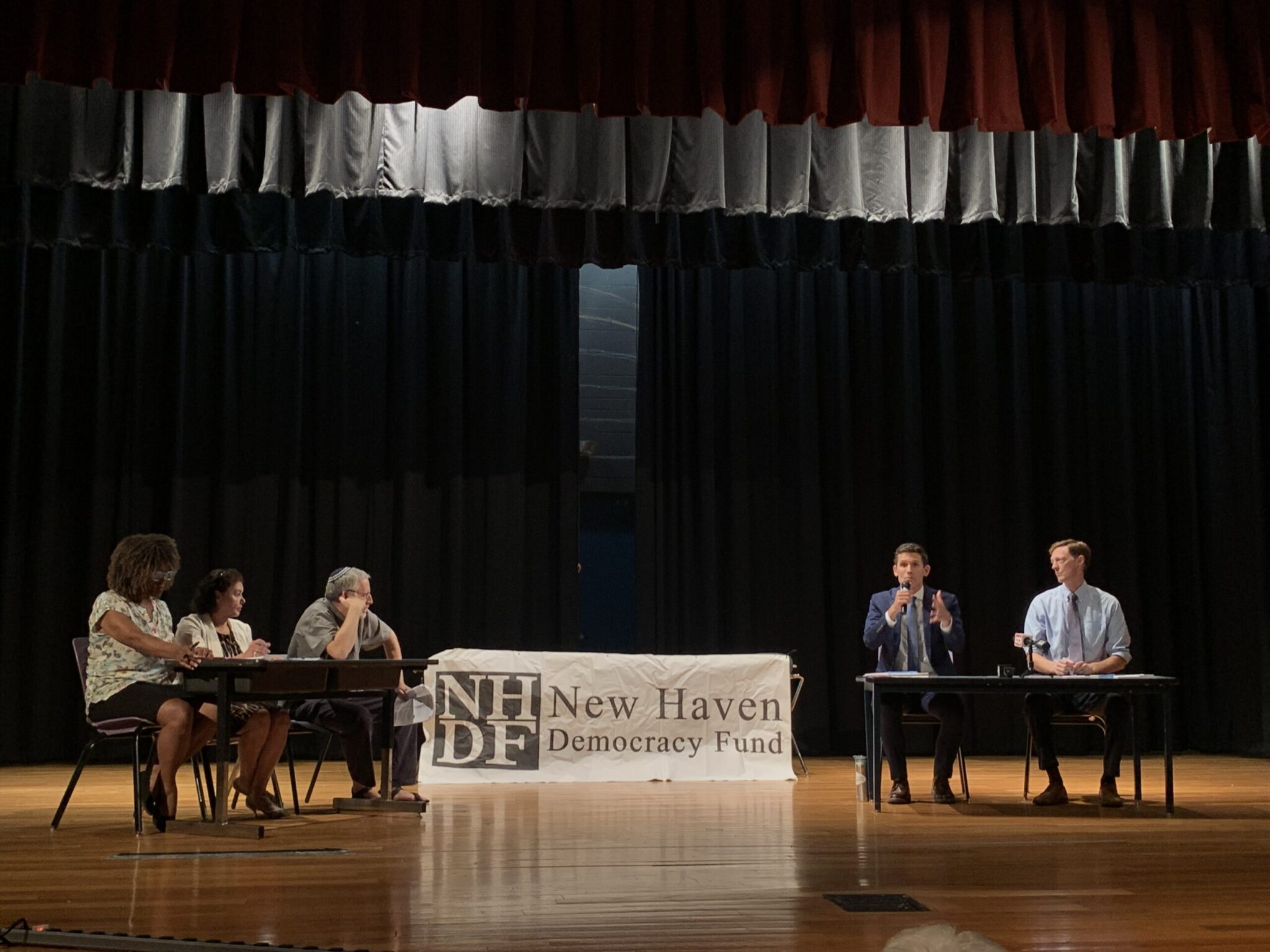Two mayoral Democratic primary candidates face off in debate
The two candidates agreed on many issues, but differed on their proposed approaches to drug use and stopping the flow of illegal guns into the city.

Olha Yarynich, Contributing Photographer
Justin Elicker and Liam Brennan, the two mayoral Democratic primary candidates, faced off in a largely civil and informative debate Tuesday night.
Both candidates are participating in the New Haven Democracy Fund — a public program that provides campaign grants and matching contributions in order to limit the impact of private money on city politics. As a requirement of the program, the candidates met in an hour-long debate hosted by the fund and the New Haven Independent at Hill Regional Career High School.
During the debate, Elicker and Brennan agreed on what they see as the major problems facing New Haven: landlords who mistreat their tenants, a lack of affordable housing, outdated zoning laws and a significant shortage of teachers. But the candidates disagreed on how to approach these problems, as well as whether the other has the appropriate experience and skillset to implement solutions the city needs.
“We have some different policies, but ultimately, this is about experience,” Elicker said at the debate, pointing to his two terms as mayor.
Elicker touted his achievements in governing the city since he took office in 2019. He cited his administration’s successful negotiation with Yale to increase the University’s voluntary payments to the city and the launch of the COMPASS non-violent crisis response team.
Elicker also pointed to the city’s negotiations for higher teacher salaries but received pushback from Brennan, who argued that his administration resisted a salary increase. Elicker responded by noting that Brennan was not present during negotiations as Brennan had turned down a seat on the Board of Education back in 2019.
In his responses, Brennan accused the Elicker administration of not having a clear vision of the city’s development, not setting ambitious goals and failing to communicate effectively with residents.
“I don’t know where the city wants to go. Do you know where the city wants to go?” he asked Elicker during one exchange.
New Haven leaders and politicians, Brennan said, think too small and too often accept the status quo. Instead, he pledged to campaign on behalf of those who want to do “bigger things” to change the city.
Reflecting on his four years as mayor, Elicker said that the city’s governing structure makes it hard to get things done. Citing his work to streamline infrastructure projects, Elicker said that he is working on modernizing city departments to increase that rate of reform.
“We are doing a lot, and we need to do more on pretty much every issue,” Elicker said, summarizing his reelection campaign message.
Fielding questions about whether he had enough experience to run the city, Brennan said he believes his experience “holds up” to those of former incoming mayors in New Haven.
He cited his previous executive roles with the Connecticut Veterans Legal Center and the Connecticut Public Corruption Task Force at the Department of Justice. While at the DOJ, he said he oversaw dozens of agents, while simultaneously working on dozens of cases. Brennan recently served as the Inspector General of Hartford.
The debate heated up when the candidates clashed on public safety.
Elicker criticized Brennan, saying that Brennan “does not believe in arresting drug dealers and does not believe in arresting people with illegal weapons.”
Brennan fought back, clarifying that supports decriminalizing drug possession — not drug dealers as he claimed the Elicker administration has. Brennan said the city should instead shift its focus toward supporting harm reduction programs resources.
Elicker insisted that the New Haven police under his administration have only arrested drug dealers, not users. Brennan countered Elicker’s claim, saying that over 300 people were arrested for drug possession in New Haven in 2020.
Elicker argued that the statistic Brennan cited was too far in the past and no longer relevant, saying, “We’re in 2023.”
On the issue of illegal guns, Elicker also highlighted his administration’s success in removing hundreds of illegal guns from the streets, while Brennan advocated for using subpoena power to cut off the “gun pipeline” before they reach the streets.
Following the debate, attendee Robert Gibson expressed his appreciation for the democratic process in New Haven.
“We have two candidates, both equally capable of being mayors, squaring off to share their ideas with the public,” Gibson said. “It’s good that people can compare them to come to a conclusion about who’s the best person for the job.”
New Haven resident Mary Giannotti told the News she thinks Elicker is “sharper” but also a choice that would continue the status quo.
“I think that Liam is a breath of fresh air and probably falls a little bit more in line with my politics leaning left as compared to Justin,” Giannotti said.
Voters will head to the polls for Democratic primary elections in New Haven on Sept. 12.







